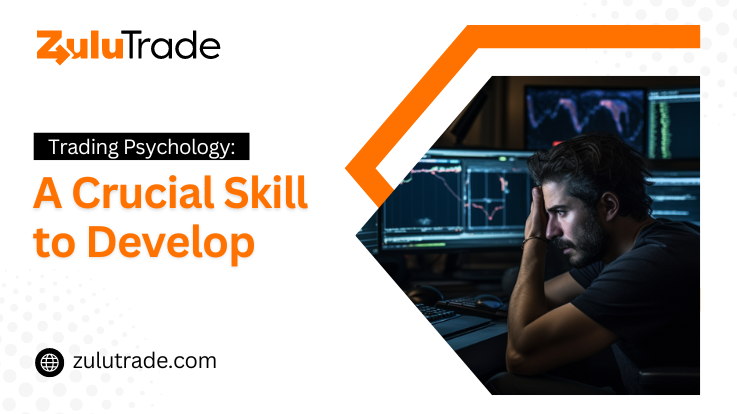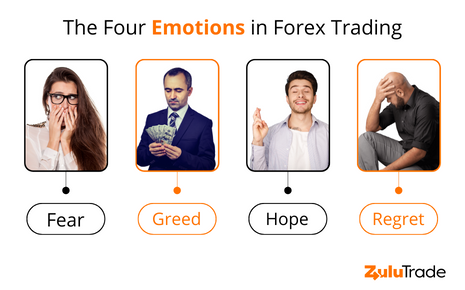
The exciting, fast-paced world of Forex trading isn’t just about charts and numbers. Behind every trade, every decision, is a complex mix of emotions that can make or break a trader’s success. This article will dive deep into the pivotal role of trading psychology, specifically examining the twin influences of fear and greed. If you’ve ever wondered, “Is trading based on psychology?” you’re about to discover that the answer is a resounding yes!
What is Trading Psychology?
Trading psychology is a crucial aspect of forex trading often overlooked by beginners. It refers to the emotional and mental state of a trader, and it’s this mindset that often determines the success or failure of a trading decision. Just as an athlete trains both body and mind for competition, a trader needs to equip themselves with not only financial knowledge but also emotional intelligence.
The Four Emotions of Trading

There are four primary emotions at play in forex trading – fear, greed, hope, and regret. These emotions can either work for or against traders, depending on how well they can control them.
Fear
Fear is a potent emotion in forex trading. Traders fear losing money, missing out on a good trade, or leaving too soon and missing the peak. This emotion can lead to hasty decisions, selling too soon or holding onto a losing position in the hope it will turn around.
Greed
Greed, the flip side of fear, is equally influential. The prospect of enormous gains can blind traders to the risks involved, leading them to invest too much or hold onto a trade for too long, hoping for even bigger profits.
Hope
Hope can be a double-edged sword in trading. On one side, it keeps traders motivated and optimistic. On the other hand, too much hope can lead to reckless behavior and irrational decisions.
Regret
Regret often follows a trading decision that didn’t pan out as planned. Traders can find themselves in a loop of “what if” scenarios, causing them to lose focus and make misguided future trading decisions.
The Mindset of a Successful Forex Trader
Understanding the psychology behind forex trading is just half the battle. The other half is cultivating the mindset of a successful trader. Successful traders aren’t those who never fail but those who learn from their failures. They are patient, disciplined, and have a well-defined trading strategy that they follow regardless of their emotions.
How Can I Improve My Forex Trading Psychology?
Improving your trading psychology involves recognizing and understanding your emotional reactions to trading. Some strategies for improvement might include setting clear trading goals, practicing disciplined money management, using stop-loss orders to manage risk, and taking regular breaks from trading to avoid fatigue and maintain perspective.
Additionally, one effective strategy to augment your trading psychology is by following the trades of expert traders, a concept commonly referred to as copy trading. This can provide a practical learning experience, helping to develop your understanding of successful trading strategies and decision-making processes under varying market conditions. Through observation and replication of professional trades, you can gain insights into market trends and strategies, which could help to manage your own trading anxiety and enhance your confidence. Just remember, no strategy is foolproof, and it’s essential to do your own research and maintain a balanced trading approach.
Why is Forex Trading So Difficult?
Many people find forex trading challenging because of the emotional volatility involved. The highs of a successful trade and the lows of a failed one can be extreme, leading to emotional trading decisions rather than rational ones. This is why it’s often said that around 90% of traders lose money.
Mastering Trading Psychology
In understanding the psychology behind forex trading, we have to address an important question: “How can I control my mind in trading?” Mastering your emotions and understanding the psychology of trading isn’t something that happens overnight. It’s a skill developed over time, with experience, patience, and a lot of introspection.
Embrace a Growth Mindset
Adopting a growth mindset is a first step towards better trading psychology. This approach encourages viewing losses as opportunities to learn and grow, rather than setbacks. Successful traders know that even the most well-planned trades can fail, and they use these experiences as lessons to inform their future decisions.
Learn to Accept Losses
Learning to accept losses is another critical aspect of trading psychology. As the saying goes, “You win some, you lose some.” Losses are a part of forex trading. They do not define your abilities as a trader. Understanding and accepting this fact helps build resilience and prevents emotions like fear and regret from taking control of your decision-making process.
Develop a Trading Plan
A well-defined trading plan serves as a roadmap for your trading journey. It outlines your financial goals, risk tolerance, and trading strategies. Having a plan and sticking to it not only provides structure to your trading activity but also aids in keeping emotions like fear and greed at bay.
Overcoming the Fear-Greed Cycle in Forex Trading
Forex trading can feel like an emotional rollercoaster at times. When trades go well, the thrill can be intoxicating. When they don’t, the disappointment can be crushing. This constant cycle of fear and greed can make forex trading seem incredibly difficult, with some statistics suggesting that 90% of traders lose money. However, by understanding and implementing solid forex trading psychology, you can become part of the successful 10%.
Understand Your Emotional Triggers
The first step in breaking the fear-greed cycle is to understand your emotional triggers. Recognize what situations trigger fear or greed in you. Once you know your triggers, you can take steps to manage your reactions to them better.
Practice Mindful Trading
Mindful trading involves being fully present and focused on your trading activities. It means paying attention to your emotions and thoughts without judgment. This practice can help you make more rational decisions and reduce the impact of emotions like fear and greed on your trades.
Create a Balanced Life
A balanced life can help manage the emotional ups and downs of forex trading. Regular exercise, a healthy diet, good sleep, and leisure activities can all contribute to better emotional health and, in turn, improve your trading performance.
Conclusion
Forex trading psychology is a complex field that can be as unpredictable as the markets themselves. It is a psychological battle with yourself. However, by understanding the role of emotions like fear and greed in trading decisions and employing strategies to manage these emotions, traders can significantly improve their chances of success in the forex market. Remember, every trader experiences wins and losses; what sets successful traders apart is their ability to learn from these experiences and maintain control over their emotions. When you can do that, you’ll find that the world of forex trading isn’t so difficult after all.
